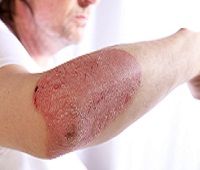Article
Plaque Psoriasis: Switching Biologics Effective, Study Finds
Author(s):
Researchers have recently shown that switching from one biological agent to another could potentially prove effective for patients with plaque psoriasis when the initial treatment agent elicits insufficient response.

Researchers have recently shown that switching from one biological agent to another could potentially prove effective for patients with plaque psoriasis when the initial treatment agent elicits insufficient response.
According to a study published in the Journal of the European Academy of Dermatology and Venereology, a dermatologic research team from Vienna, Austria, evaluated the effectiveness of biologic treatments over a 1-year period, looking at safety and quality-of-life outcomes among patients diagnosed with plaque psoriasis who had switched to adalimumab from other biologic therapies.
The 42 patients involved in the multicenter study were treated with adalimumab over a 1-year period, after switching from efalizumab, infliximab, or etanercept.
Effectiveness was assessed using standardized tools like the Psoriasis Area and Severity Index (PASI), Nail Psoriasis Severity Index (NAPSI), and the Dermatology Life Quality Index (DLQI) for the measurement of disease severity. The study endpoints were evaluated using the all-treated population.
The study results found that the average percentage of improvement was reported 74.3% for PASI, 81.6% for DLQI, and 83.6% for NAPSI, indicating a favorable outcome with adalimumab treatment. The safety profile observed was consistent with previous clinical trials for adalimumab, and no new safety signals were observed.
The authors concluded, “Adalimumab therapy in patients with plaque psoriasis previously treated with other biologic agents demonstrates effectiveness, safety and improvement in quality of life.”





